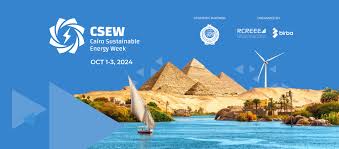Cairo – The Cairo Sustainable Energy Week opened in the Egyptian capital, but Africa’s sustainability and renewables development remains far off target compared to the continent’s potential. “In light of the current geostrategic challenges, particularly after the outbreak of war in Ukraine and continuing crises in other regions such as Sudan, international cooperation has become paramount. The Arab region is experiencing serious impacts on investments, freedom of movement, and economies, with a focus on issues related to energy security and stability in the region,” Jamila Matar, director of the Arab League’s Energy Department, stressed in her video interview. “The energy transition is moving forward, fortunately, but not with the same speed or pace as it used to be. The political aspects are reflected in everything. In the Middle East, we do not have one problem but many. Political unrest is everywhere, and people have priorities in their energy perspective,” she added.
“Unfortunately, despite being the continent with the most solar and wind, renewables in Africa are still lagging. Every year, so much renewable energy is injected, particularly in America, Europe, and China, while in Africa, just 2 percent. The reason is easy: there is resistance. Therefore, Africa should increase private investment because African public ones don’t have a great input. However, if Enel, Terna or Cesium were to invest…” stressed Roberto Vigotti, secretary general of the Res4Africa foundation. “Private investment is often not possible because it is still blocked by the policy system. So, Africa still cannot store renewable energy except for hydropower. We have to make sure that the systemic approach, meaning renewables plus storage, becomes a must,” he pointed out. “Today I have to say that in this conference, many countries have talked about smart grids — grids that have digital sensors that can store energy,” Vigotti pointed out. However, electrification “is not a short-term thing. It takes its time. You have to be patient for 20 to 30 years also because of the benefits that giving electricity to Africans entails i.e., allowing young Africans to become self-reliant,” the secretary general of the Res4Africa foundation explained. “Imagine the kids in China, Thailand, Brazil, etc. In sub-Saharan Africa, 30 percent have electricity, and 70 percent have cell phones. You have to be able to give them a chance to become experts in electricity and have patience. We, as Res4Africa, together with the Italian champions, manage to pass confidence onto them,” Vigotti stressed.
“Africa could be energy independent. Unfortunately, recent events have caused Europeans to keep looking to Africa in a somewhat colonial way to take their gas and coal. Surely, Africans are capable in the next 20 years of autonomy and even export electricity from renewable sources. There is a delay as the current approach, in the short term, is to go to some countries and take the gas that we have been lacking since the outbreak of war in Ukraine. Together, however, Italy is doing a very good job with the Mattei Plan,” concluded the secretary general of Res4Africa. “We need new business models and financial investments. We need regional forums where we can talk not only about natural situations but have comparisons to start building something, together. We need to work on sustainable cities,” Roberta Boniotti, secretary general of Medener, the Mediterranean Association of National Energy Management Agencies, said.
English version by the Translation Service of Withub



